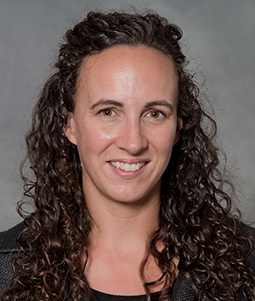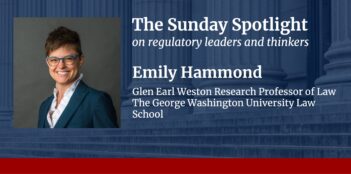
The time is ripe for an Office of Public Participation at the Federal Energy Regulatory Commission.
In 1978, Congress directed the Federal Energy Regulatory Commission (FERC) to create an Office of Public Participation (OPP) to enhance the public’s ability to weigh in on energy policy. For over four decades, FERC took no action to create or staff such an office. Today, though, the OPP appears finally on the precipice of coming into existence. Last December, Congress instructed FERC to file a report by late June 2021 detailing its progress toward establishing an OPP.
Creating an office that successfully enhances public participation in the arcane, technocratic world of energy regulation will be no easy task. But just because FERC proceedings are technical does not mean that they do not dramatically impact people’s lives. As evidenced by the testimony delivered during FERC’s spring 2021 listening sessions on its new office, landowners facing the prospect of natural gas pipelines sited across their property and communities disproportionately bearing a century-plus of fossil-fuel infrastructure’s brutal health and environmental consequences fully understand the wide-ranging consequences of FERC’s decisions––even if they do not feel well-equipped at present to engage with the agency.
Fortunately, past research on agency participation offers some guideposts for FERC’s efforts to create effective public engagement in energy policy. One central consideration will be who the OPP should seek to engage; another will be how.
The 1978 statute’s implicit charge, in asking FERC to engage “the public,” was for the agency to engage new and broader constituencies than those that have traditionally participated at FERC. Particularly given FERC Chair Richard Glick’s new emphasis on energy and environmental justice, the OPP should prioritize engaging historically marginalized communities and communities disproportionately burdened by energy infrastructure. In this regard, there will be both a “translating out” and a “translating in” function that the OPP could play.
“Translating out” refers to those activities that the OPP could undertake to make technocratic FERC proceedings understandable and relevant to the public. Beyond basic improvements in terms of the ease of intervention and commenting, the OPP might also provide trainings, layperson-oriented informational materials, and designated point persons of contact for significant proceedings. Drawing on recommendations issued in 2018 by the Administrative Conference of the United States (ACUS), the OPP might also hire field staff, trained in grassroots engagement, who can work to build relationships with constituencies underrepresented at FERC.
“Translating in” will be an equally important role for an effective OPP. Researchers have found that when “undervoiced” stakeholders engage in federal rulemakings, they often provide what is termed “situated knowledge”—or knowledge that arises from lived reality. These stakeholders raise highly germane issues, but they do so in language and with framing different from industry stakeholders or repeat interveners. OPP staff might highlight for commissioners and their staffs the ways in which these non-industry stakeholders speak to key issues in proceedings.
In doing so, there may be good reasons for OPP staff to avoid assuming direct advocacy roles that subject them to ex parte restrictions. Perhaps, however, valuable “translating in” could be accomplished without requiring staff to cross the line into advocacy—including through non-proceeding-specific training sessions and ongoing discussions within FERC about the role of situated knowledge within the agency’s mission. Situated knowledge will be particularly important as FERC considers how to better integrate equity and environmental justice into its activities and frameworks.
FERC will also have to consider carefully the when of participation. Research consistently shows that earlier participation is more valuable, at a stage before a proposed project or rule is formally before the Commission.
In the case of electricity-related proceedings at FERC, timing often equates with venue. As I have explained in detail elsewhere, the predominant model of grid governance in the United States delegates considerable authority to membership-based regional transmission organizations (RTOs) to develop energy market rules and tariffs through internal governance processes—all before filing these rules and tariffs for FERC approval. Once RTOs have filed requests to approve new rules and tariffs, the Commission is limited by deferential review standards and restrictive judicial precedent in its ability to shape these proposals. For this reason, the OPP should also devote attention to improving participation and transparency in the notoriously opaque regional governance processes.
It will also be essential for FERC to link enhanced public participation with a substantive commitment to reform. At its best, the OPP could help FERC receive a wealth of new and valuable perspectives on how to interpret and apply the Commission’s broad and malleable charges of statutory authority—such as its requirements to ensure “just and reasonable” rates and make decisions based on “public convenience and necessity.”
FERC must take seriously the broadened input that the OPP should facilitate. Researchers caution heavily against government officials encouraging public participation that they do not truly value, thereby “peddling democratic snake oil” that is likely to disenchant participants over time and harm an agency’s reputation.
This risk counsels for two additional roles for the OPP in public engagement efforts. First, the OPP should clearly flag for the public those proceedings—and even particular issues within proceedings—where the Commission believes that public input would be most beneficial. In doing so, FERC might draw from similar efforts at other agencies, including the U.S. Department of Transportation and the Environmental Protection Agency, as described in a 2018 report to ACUS on improving public engagement in rulemakings. Second, the Commission, assisted by the OPP, should clearly communicate to public interveners the ways in which their input has shaped the Commission’s decisions, beyond merely including pro forma responses to comments tucked into hundreds-page-long orders.
Although the OPP has been too long in coming, the office’s time has never been more ripe. The energy system stands at a moment of deep contestation. As many fossil fuel companies fight hard to maintain their market share in a world of cost-competitive renewable energy and raging climate change, many communities are developing their own powerful visions for a cleaner, more distributed, and more just energy system. FERC policy shapes the potential of such visions in critical but often difficult-to-discern ways. Bringing these connections to the fore, so as to foster deeper democratic engagement at FERC, should be a central goal of the OPP.
This essay was adapted from remarks Professor Welton delivered at a FERC workshop held on April 16, 2021, to discuss the agency’s Office of Public Participation.




